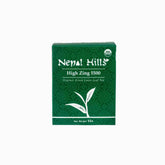Black Tea: The ultimate guide to Its rich flavors and health benefits
Black tea, a cherished beverage around the globe, offers an array of flavors and numerous health benefits. Derived from the Camellia sinensis plant, black tea has captivated the taste buds and health-conscious individuals alike.
This article delves into the fascinating aspects of black tea, exploring its rich history, diverse varieties, and the numerous health benefits it provides. Whether you are a seasoned tea drinker or new to the world of tea, this guide will enrich your knowledge and appreciation of black tea.
Article Outline
1. What is Black Tea?
2. How is Black Tea Made?
3. The Rich Flavors of Black Tea
4. Caffeine Content in Black Tea: What You Need to Know
5. Health Benefits of Black Tea: Why You Should Drink It
6. Black Tea and Cardiovascular Health: Can It Reduce the Risk of Stroke?
7. Black Tea and Diabetes: How It Helps in Managing Blood Sugar Levels
8. Black Tea and Cancer: What Research Says
9. The Role of Oxidation in Black Tea Production
10. How to Brew the Perfect Cup of Black Tea
11. Black Tea Across Cultures
12. FAQs About Black Tea
What is Black Tea?
Black tea is one of the most popular types of tea, made from the leaves of the Camellia sinensis plant. Unlike green tea, which is minimally processed, black tea undergoes a full oxidation process that gives it its distinctive dark color and robust flavor. The tea leaves are withered, rolled, oxidized, and dried to produce various forms, including loose leaf tea, tea bags, and even pressed bricks.
How is Black Tea Made?
The production of black tea involves several steps:
1. Withering: Freshly plucked tea leaves are spread out to wither, losing moisture and becoming pliable.
2. Rolling: The withered leaves are rolled to break the cell walls, releasing essential oils and initiating oxidation.
3. Oxidation: This critical step involves exposing the rolled leaves to air, allowing them to darken and develop their characteristic flavors.
4. Drying: Finally, the oxidized leaves are dried to halt the oxidation process and preserve the tea.
The process of oxidation is what differentiates black tea from green and oolong teas, influencing its flavor and health properties.
The Rich Flavors of Black Tea
A Symphony of Tastes
Black tea offers a wide range of flavors, from malty and brisk to floral and fruity. These flavors depend on the region of production, the specific tea plant variety, and the production methods used. Theaflavins and thearubigins, polyphenols formed during oxidation, contribute to black tea's rich taste and dark color.
Versatility in Blends
While many enjoy black tea in its pure form, it is also popular in blends. Some well-known black tea blends include:
- Earl Grey: Infused with bergamot oil for a citrusy twist.
- Chai: Spiced with cinnamon, cardamom, and cloves.
- English Breakfast: A robust morning blend.
Caffeine Content in Black Tea: What You Need to Know
How Much Caffeine is in Black Tea?
Black tea contains caffeine, but less than coffee. On average, a cup of black tea contains about 40-70 mg of caffeine, compared to 95-200 mg in a cup of coffee. This moderate caffeine content makes black tea a perfect choice for those seeking a gentle energy boost without the jitters.
Comparing Caffeine Levels in Different Teas
The caffeine content in black tea can vary depending on the type and brewing method. For instance, green tea contains less caffeine (about 20-45 mg per cup), while oolong tea falls somewhere in between green and black tea. Understanding the caffeine levels can help you choose the right tea for your needs.
Health Benefits of Black Tea: Why You Should Drink It
Boosting Metabolism and Weight Management
Black tea is known to boost metabolism, which may aid in weight management. The polyphenols in black tea, particularly theaflavins and thearubigins, have been shown to enhance fat oxidation and improve overall metabolic health.
Supporting Heart Health
Regular consumption of black tea may reduce the risk of cardiovascular disease. Studies have found that black tea can help lower blood pressure and cholesterol levels, contributing to improved heart health. Drinking black tea daily can be a delicious way to support your cardiovascular system.
Black Tea and Cardiovascular Health: Can It Reduce the Risk of Stroke?
The Link Between Black Tea and Stroke Prevention
Research suggests that drinking black tea may reduce the risk of stroke. The antioxidants in black tea, such as flavonoids, help improve blood vessel function and reduce inflammation, which are key factors in preventing strokes.
How Much Black Tea Should You Drink?
To reap the cardiovascular benefits, it's recommended to drink at least three cups of black tea daily. However, moderation is key, as excessive tea consumption can lead to adverse effects due to its caffeine content.
Black Tea and Diabetes: How It Helps in Managing Blood Sugar Levels
Regulating Blood Sugar Levels
Black tea may help manage blood sugar levels, making it beneficial for those with type 2 diabetes. The polyphenols in black tea have been shown to improve insulin sensitivity and reduce blood glucose levels.
Incorporating Black Tea into a Diabetes-Friendly Diet
Including black tea in your daily routine can be a simple yet effective way to support diabetes management. Pairing it with a balanced diet and regular exercise can enhance its benefits.
Black Tea and Cancer: What Research Says
Potential Anti-Cancer Properties
The antioxidants in black tea may also play a role in cancer prevention. Some studies suggest that the polyphenols in black tea can inhibit the growth of cancer cells and reduce the risk of certain types of cancer, such as ovarian and breast cancer.
Ongoing Research
While the research is promising, more studies are needed to fully understand the relationship between black tea and cancer prevention. However, regularly drinking black tea as part of a healthy lifestyle may contribute to overall cancer risk reduction.
The Role of Oxidation in Black Tea Production
What is Oxidation?
Oxidation is a crucial step in black tea production that affects its flavor and color. During oxidation, the tea leaves are exposed to air, causing the catechins in the leaves to convert into theaflavins and thearubigins. This process gives black tea its distinctive dark color and robust flavor.
Controlling Oxidation for Different Flavors
The degree of oxidation can be controlled to produce different flavors and aromas in black tea. For example, a longer oxidation process can result in a richer, more robust flavor, while a shorter oxidation process may produce a lighter, more delicate taste.
How to Brew the Perfect Cup of Black Tea
Choosing the Right Tea Leaves
For the best flavor, opt for high-quality loose-leaf black tea. The freshness and quality of the tea leaves are crucial for a perfect brew. Store your tea in an airtight container away from light and moisture to maintain its freshness.
Optimal Water Temperature and Steeping Time
Boil water and let it cool slightly to about 200°F (93°C). Steep the black tea for 3-5 minutes, depending on your taste preference. Taste the tea every 30 seconds during steeping to find your ideal flavor.
Enhancing Your Tea
While black tea is delicious on its own, you can enhance it with milk, sugar, or lemon. Adding a drop of lemon juice can brighten the flavors of certain black teas, like Darjeeling or Earl Grey.
Black Tea Across Cultures
India: Chai Culture
In India, masala chai is a spiced tea made with milk and sugar, often using C.T.C. tea. Street vendors serve this aromatic beverage, making it a popular choice for waking up in the morning or as an afternoon pick-me-up.
China: Red Tea Tradition
Known as hong cha, black tea in China is revered for its boldness. Iconic varieties include Keemun, Lapsang Souchong, and Dianhong, each offering unique flavors and aromas.
Russia: Samovar Rituals
Russians favor strong black tea, often brewed in a samovar and sipped with sugar cubes and lemon slices. This tradition highlights the deep cultural significance of tea in Russian society.
Turkey: The Art of Çay
Turkish tea, or çay, is a social ritual served in small glasses, symbolizing hospitality and conversation. Though not native to Turkey, tea has become an integral part of daily life.
Frequently asked questions about black tea
Q: Is black tea good for weight loss?
A: Black tea is said to boost metabolism and may aid in weight management.
Q: Does black tea have caffeine?
A: Yes, but less than coffee. It provides a gentle energy lift.
Q: Can I drink black tea on an empty stomach?
A: Yes, but it’s best with food to prevent acidity.
Q: What’s the best time to enjoy black tea?
A: Morning for a wake-up call or afternoon for a pick-me-up.
Q: How do I store black loose leaf tea for freshness?
A: Keep it away from light, air, and strong odors.
Q: Can I reuse black tea leaves for multiple infusions?
A: Yes, especially with high-quality loose-leaf teas. We suggest 2-3 steeps not more. Steeping time will be longer for secondary and tertiary steeps and you will not find the same taste as the first steep though.
Q: Does black tea stain teeth?
A: Yes, but regular dental care can prevent staining.
Q: What’s the secret to a strong cup of black tea?
A: Longer steeping time and hotter water yield stronger brews.
Key Takeaways
- Black Tea Basics: Derived from Camellia sinensis, black tea undergoes full oxidation, giving it its distinctive dark color and robust flavor.
- Health Benefits: Regularly drinking black tea can boost metabolism, support heart health, manage blood sugar levels, and may reduce cancer risk.
- Cultural Significance: Black tea is enjoyed globally, from Indian chai to Chinese hong cha, and each culture has its unique traditions.
- Brewing Tips: For the perfect cup, use high-quality loose-leaf tea, steep at 200°F (93°C) for 3-5 minutes, and consider enhancing with milk, sugar, or lemon.
Black tea offers a delightful journey through rich flavors and numerous health benefits. Embrace the world of black tea and explore its diverse varieties and traditions.
**Disclaimer:** The health benefits of black tea mentioned in this post are based on current scientific research and traditional uses. However, individual responses to tea can vary, and these benefits may not apply to everyone. It is important to consult with a healthcare provider before making any significant changes to your diet or health routine, especially if you have underlying health conditions or are taking medication. The information provided here is for educational purposes only and should not be considered as medical advice.
Authored By:
Bhaskar Dahal
2nd Generation Tea Entrepreneur
Founder and C.E.O, Nepal Hills Tea Inc.





